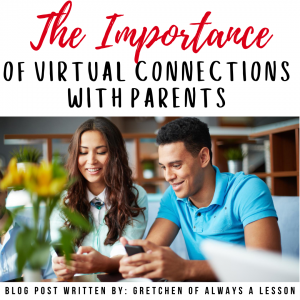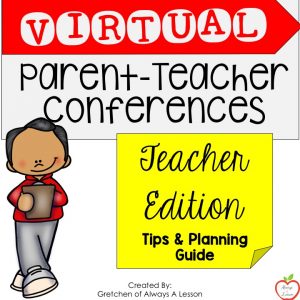The Importance of Virtual Connections with Parents
Virtual connections are becoming more important by the day as schools are forced to move to distance learning models. Traditional in-person parent communication methods (conferences, open houses, school events etc.) are no longer at an educator’s disposal due to COVID-19 precautions. This doesn’t mean parent communication halts; rather, it’s time to reinvent the way parent communication is delivered.
[bctt tweet=”Obstacles are only problems that you haven’t figured out how to work around yet. ” username=”gschultek”]
 Necessity of Virtual Connections
Necessity of Virtual Connections
Virtual connection is more essential than ever. In 2020, parents are required to be more heavily involved in the schooling of their child. Not only do teachers need to continue to communicate student progress, but they also need to discuss logistics, tips, strategies, and troubleshoot technology issues. This is a mix of traditional communication topics with parents and those discussed with substitute teachers.
These conversations are new both for the parent and the teacher. Therefore, it’s important to be transparent with the adjustment as well as ask for feedback to continue making it a positive and impactful experience.
[bctt tweet=”Virtual connections pave the way for successful student learning, even in times of crisis. ” username=”gschultek”]
Virtual Connections for Various Models
The three most discussed learning models for the Fall of 2020 school year are distance learning, homeschooling and a hybrid option. Virtual connections can occur in each of these models, although they might look different.
- Distance Learning– With students working from home via various online platforms, the teacher is still directing the learning. Parents might check in from time to time to make sure students are logging in during specific learning times and completing assignments. Although this might be more involvement for parents than traditional models, they are still relying on the teacher to communicate with them about their child’s progress (ie. overall performance, learning support options, academic struggles or concerns, missing assignments, etc.). Teachers can also share tips for learning at home, such as managing time, prioritizing tasks, and more.
- Homeschooling– Teachers will pass the instructional baton to parents in this learning model. Although teachers will prepare learning materials and deliver to students’ homes, the parents are in charge of carrying out the learning and completion of the materials. Schools might collect these materials or require students to submit only certain assignments online for grading purposes. Some school districts might even do a pass/fail system with no specific grades. Some ways teachers can make themselves available to parents is to hold office hours to answer live Q/A’s, respond to emails in a timely manner, create a reference website for common obstacles or examples of quality instructional techniques and outcomes, etc.
- Hybrid Learning– Hybrid simply means a mix of in-person and online learning. Teachers and parents will partner together in the learning of the child in all hybrid models. Parents and teachers will communicate virtually in the same ways mentioned in both distance learning and homeschooling models shared above.
Parent-Teacher Conferences via Virtual Connections
 It is important to conduct the ongoing communication ideas mentioned above, but there can still be more formal opportunities to chat live with parents, like during virtual parent-teacher conferences.
It is important to conduct the ongoing communication ideas mentioned above, but there can still be more formal opportunities to chat live with parents, like during virtual parent-teacher conferences.
Oftentimes with ongoing communication, messages are shared in passing without both parties being available at the same time to have a more thorough discussion. By setting aside a common time to virtually meet, parents and teachers can get caught up on the progress of the child, answer questions, clarify expectations and requirements, etc. Hosting live virtual chats with parents is a great way to bring clarity and comfort to the partnership. Click the photo to get all the tips!
GO BE GREAT!
How are you virtually connecting with parents?

